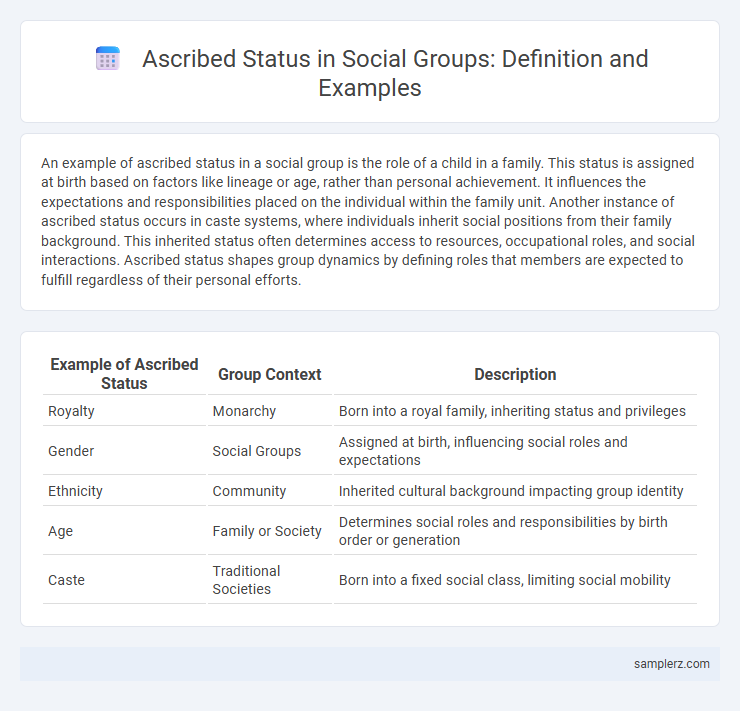An example of ascribed status in a social group is the role of a child in a family. This status is assigned at birth based on factors like lineage or age, rather than personal achievement. It influences the expectations and responsibilities placed on the individual within the family unit. Another instance of ascribed status occurs in caste systems, where individuals inherit social positions from their family background. This inherited status often determines access to resources, occupational roles, and social interactions. Ascribed status shapes group dynamics by defining roles that members are expected to fulfill regardless of their personal efforts.
Table of Comparison
| Example of Ascribed Status | Group Context | Description |
|---|---|---|
| Royalty | Monarchy | Born into a royal family, inheriting status and privileges |
| Gender | Social Groups | Assigned at birth, influencing social roles and expectations |
| Ethnicity | Community | Inherited cultural background impacting group identity |
| Age | Family or Society | Determines social roles and responsibilities by birth order or generation |
| Caste | Traditional Societies | Born into a fixed social class, limiting social mobility |
Understanding Ascribed Status in Social Groups
Ascribed status in social groups refers to positions assigned at birth or involuntarily, such as ethnicity, gender, or family heritage, which influence an individual's social identity and roles. This status often determines access to resources, social privileges, and group expectations without personal choice. Recognizing ascribed status is crucial for analyzing social dynamics, power structures, and inequalities within communities.
Key Characteristics of Ascribed Status
Ascribed status in social groups is characterized by attributes assigned at birth or involuntarily, such as race, ethnicity, and family heritage, which shape an individual's social identity and opportunities. This status is immutable and often dictates one's social roles and expectations within the community. The key characteristics of ascribed status include its lifelong permanence, lack of personal control, and social imposition based on inherited traits or birth circumstances.
Family Background as an Ascribed Status Example
Family background serves as a prime example of ascribed status, where individuals inherit social positions based on their lineage rather than personal achievements. This inherited status influences access to resources, cultural capital, and social networks within a group, often shaping life opportunities from birth. Variations in family wealth, ethnicity, and social class embedded in family background significantly impact an individual's societal role and identity.
Ethnicity and Its Role in Group Position
Ethnicity often serves as a primary example of ascribed status within social groups, as individuals are born into specific ethnic identities that influence their social positions regardless of personal achievements. This inherited attribute can determine access to resources, social networks, and group memberships, reinforcing systemic inequalities. Sociological studies show that ethnic ascribed status significantly impacts group dynamics and the distribution of power within multicultural societies.
Gender: Predefined Social Roles in Groups
Ascribed status in groups often manifests through gender, where individuals are assigned social roles based on societal expectations rather than personal achievements. For example, in many traditional communities, women may be designated as caregivers or homemakers, reinforcing predefined responsibilities tied to gender. These roles influence group dynamics by shaping participation, authority, and social expectations within the collective.
Caste System: Traditional Ascribed Status
The caste system exemplifies traditional ascribed status by assigning individuals to social groups based on birth, with membership predetermined and unchangeable throughout life. This rigid hierarchy influences access to resources, social interactions, and occupational opportunities within the community. The hereditary nature of caste status underscores the significant impact of ascribed social categories on personal identity and societal roles.
Age as a Determinant in Group Dynamics
Age as an ascribed status significantly influences group dynamics by determining roles, power distribution, and social expectations within the group. Older members often hold authority or leadership positions due to perceived experience and wisdom, while younger members may be assigned subordinate or learning roles. This age-based stratification shapes communication patterns, decision-making processes, and intergroup interactions, reinforcing social hierarchies based on chronological age.
Religious Affiliation and Social Stratification
Religious affiliation often serves as an ascribed status influencing social stratification, where individuals inherit a religious identity that can determine their social roles and community access. In many societies, membership in a particular religious group dictates social hierarchy, privileges, and limitations, affecting marriage prospects, education, and occupational opportunities. This ascribed religious status shapes social interactions and perpetuates inequality within group dynamics.
Social Class: Inherited Group Status
Ascribed status in social class is exemplified by inherited group status, where individuals are born into specific social strata that dictate access to resources, privileges, and roles within society. This status is typically determined by family lineage, ethnicity, or caste, influencing life opportunities and social mobility. Inherited social class often perpetuates societal inequalities through intergenerational transmission of wealth and cultural capital.
Nationality as an Ascribed Identifier in Society
Nationality serves as a prominent example of ascribed status in social groups, defining individuals based on the country of their birth or lineage without personal choice. This inherited classification influences social interactions, access to resources, and group identity within multinational societies. Government policies, social expectations, and cultural affiliations often reinforce nationality as a fixed social marker that shapes an individual's life opportunities and social standing.

example of ascribed status in group Infographic
 samplerz.com
samplerz.com